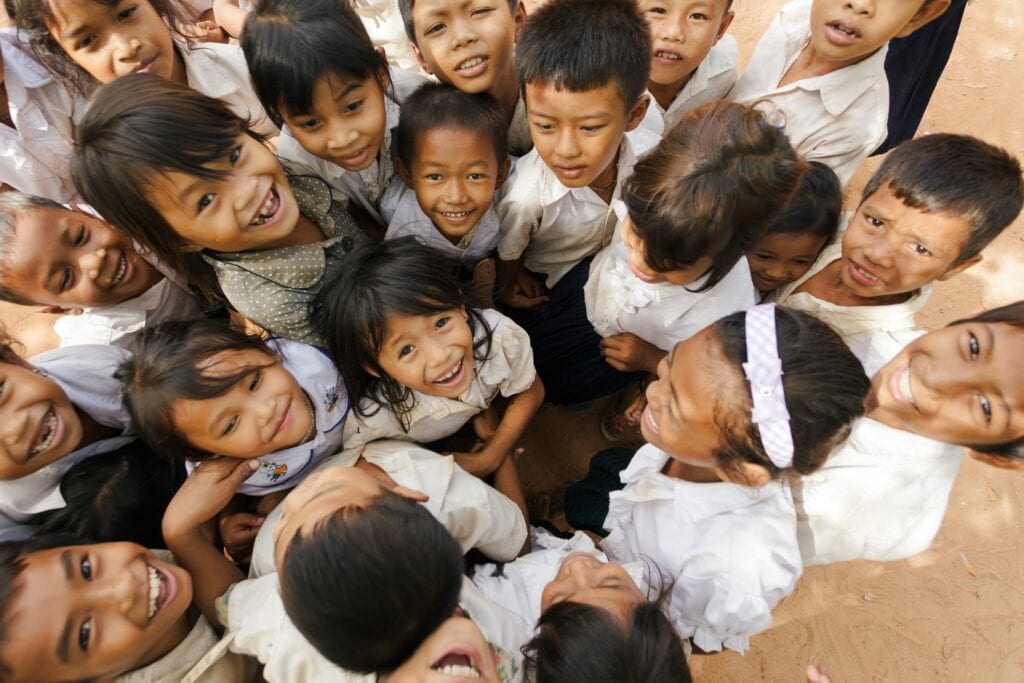View an infographic summary of the article here
5 min read
Cambodia has made great progress in educating its children, with primary school enrolment reaching over 97% in 2018. Yet despite tangible progress, children are still failing to meet global learning standards. Nearly 25% of 9-year olds cannot write a single word in a dictation exercise. When they reach 17, 55% of them would have dropped out of school. This is more pronounced for girls and young women, who comprise more than half the population but represent only a minority of tertiary graduates.
The partnership between Atlassian Foundation and Room To Read seeks to address this issue.
Room To Read is a US-based nonprofit that works to eradicate illiteracy and gender inequality in developing markets. Since 2002, it has supported Cambodian children in the two most critical time periods of education: primary school for literacy acquisition, and secondary school for girls’ education.
Based in Australia, Atlassian Foundation partners nonprofits to provide relief services that break the poverty cycle through education. It seeks to help educate 10 million disadvantaged youths in 10 years, recognising that educating women and girls is the most powerful and effective way to address global poverty.
Inspiring collaborative action with passion
With this common goal, Atlassian Foundation and Room To Read started a longstanding partnership to support rural Cambodian girls in completing secondary education.
The partnership began when Atlassian’s co-founders, Mike Cannon-Brooks and Scoot Farquhar, first encountered the book, Leaving Microsoft to Change The World by John Wood, founder of Room To Read. Inspired by Wood’s mission to bring literacy to disadvantaged kids, Atlassian decided to reach out to Room To Read.
At the same time, Room To Read started its Girls Education Program in Cambodia. Founded on the belief that educated women can change the world, the programme seeks to help rural Cambodian girls complete secondary education, and acquire the skills and agency needed to make informed choices about their lives.
Through Atlassian’s investment, the Girls Education Program supports Cambodian girls to succeed at school and beyond in four areas: life skills education, mentorship, targeted material support and family & community engagement.
Taking the collaboration to new heights
To date, the Girls Education Program has benefited over 5,500 Cambodian girls, with almost 70% of graduates going on to tertiary education without needing any financial support. Atlassian has also become the largest investor in the Girls Education Program, having funded over 70% of participants.
To explore how this collaboration became successful, here are three key practices the partners adopted:
First, a keenness from both parties to explore new modes of collaboration beyond the traditional funder-fundee relationship.
The partnership between Atlassian and Room To Read has thrived due to mutual support and engagement, with a joint commitment to constantly explore new ways of working for greater impact.
As Room To Read’s Girls Education Program expands in scope and reach, Atlassian has also augmented their annual grant commitment with new initiatives. In 2014, Atlassian launched its ‘$1 a day’ Workplace Giving Campaign, where the foundation sponsors one Cambodian girl for every Atlassian staff.
Staff are also encouraged to contribute to another girl’s sponsorship, by committing $1 per day. To encourage staff participation, Atlassian and Room To Read worked together to provide quarterly updates to staff, so that they can follow the impact of their contributions to the Girls Education Program.
Today, almost half of Atlassian’s total staff strength of 4,000 participate in this initiative. Groups of staff are also given opportunities to spend time on the ground, to see how the Girls Education Program work and meet some of the participants. This further encourages staff to increase their participation and spread the word.
Following the success of this partnership model, Room To Read now promotes this approach to all its global corporate partners. Atlassian has also become one of Room To Read’s largest corporate investors, in both financial and non-financial support.
Second, a shared commitment to measure the impact of their investments, and use the findings to improve outcomes.
Both Atlassian and Room To Read have a shared belief in using data to evolve and improve programs for social impact. Besides investing in program operations, Atlassian funded Room To Read’s efforts to strengthen the evidence on life skills education to acquire gender equality in education.
With Atlassian’s investment, Room To Read designed a Life Skills Assessment to capture changes in participants’ skills, attitudes and habits, as they move through the life skills curriculum in the Girls Education Program. That gives Room To Read a standardised assessment mechanism to ensure that its life skills curriculum achieves its desired outcomes.
The benefits of this are multifold. It helped to establish proof of concept for the Girls Education Program, and also allowed Room To Read to share its initiatives – and their impact – with relevant stakeholders. By leveraging global indicators to adapt the initiatives to local contexts, the standardized Assessment has enabled partners to implement Room To Read’s programmes with confidence.
Third, a deep respect for the power of sustainable ecosystems by empowering local stakeholders
The success of the Girls Education Program can also be attributed to the holistic approach that both Room To Read and Atlassian have taken to foster collaborations and knowledge sharing within the communities. Believing that it takes a village to raise a child, the Girls Education Program works with the ecosystem – families, schools, local communities, relevant government agencies and investors – to create supportive environments for its participants. For instance, it actively collaborates with the Cambodian Ministry of Education to identify areas and time periods where girls are dropping out of school, before reaching out to them to understand why and offer support.
The Girls Education Programme also recruits local female role models as mentors, to better equip participants with the tools and encouragement to complete secondary education, negotiate future life decisions and break out of the poverty cycle. This whole process encourages knowledge transfer and sharing within communities, in a sustainable and supportive manner.
Achieving an ambitious goal to normalize girls education
The successful partnership between Atlassian and Room To Read attests to the power of collaboration between investors and social purpose organisations to achieve ambitious goals. In a world where social issues like unequal access to education transcends across multiple silos, it is even more important for like-minded stakeholders to partner and move collectively towards common goals. This is the crux of our work at AVPN.
The Girls Education Program is looking for like-minded partners to provide financial and non-financial support, so that it can scale its operations and educate more girls in Cambodia. Besides grants, the Girls Education Program is keen to connect with experienced funders and investors in the education space, to refine their activities for greater impact. Find out more about how you can support the Girls Education Program.


















